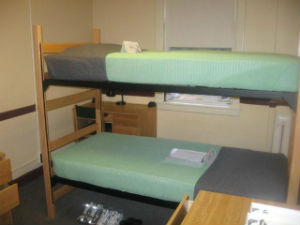What is the Level l & ll entrance process?
A person interested in becoming a Level l or ll certified officer in Vermont must apply to a department for employment. The individual agency will then consider the application and determine if the candidate should participate in the entrance examination process. Individuals cannot participate in the entrance process or the Level l & ll Basic Training Course without the sponsorship of an agency.
How do I get information posted on the VCJC web page?
Persons who wish information posted on the VCJC web page should e-mail the request to Lindsay Thivierge.
The website will post policing and related job openings for Vermont agencies, links to Vermont police departments, information concerning Vermont agency activity, etc.
No links of advertisements to private companies, concerns or agencies will be posted. Likewise, no link or information concerning private individuals or their activities, etc., will be posted.
All postings are at the discretion of the Executive Director and may be accepted or rejected.
How often does the Academy administer the written Entrance Examination?
The Entrance Examination is generally administered once a month.
Thirty Dollars ($30.00) will be collected at the time the test is administered.
If you have failed the examination once, you must wait one month before taking it again.
Should you fail a second time there is a four-month waiting period.
Should you fail for a third time, there is a one year waiting period.
Should you fail for a fourth time, there is a three year waiting period.
Visit the Testing Section for Testing Dates
Does the Academy provide accommodations under ADA for the written examination?
The Academy may provide accommodations for someone who submits adequate documentation of a disability that impacts test taking.
This request must be made no less than two (2) weeks in advance of the test.
Written requests are preferred.
Documentation (from a doctor, psychologist, psychiatrist, learning disabilities professional, or other person qualified to diagnose and/or treat such disabilities) of the need for such accommodation must be provided.
Contact information, including an address and telephone number, of the person who conducted the assessment must be included.
Academy staff will review the material submitted.
Further information may be requested.
It is the responsibility of the applicant to check with the Academy before the test date to make sure the accommodation will be granted.
How long is the Level lll Basic Training Course?
At this time, the Basic Course is sixteen (16) weeks long (residential) with a four (4) week post basic (option of residential or commuting) required for those who have never been in policing.
Occasionally, holidays will fall on dates that impact our training calendar and the program becomes seventeen weeks.
What are the typical physical fitness entrance standards for the Vermont Police Academy?
The Vermont Police Academy uses the standards as set forth by the Cooper Institute for Aerobics Research. The entrance standard is the 40th percentile based on age and gender. If an applicant fails any component of the test, they do not pass the test. The Academy staff expect recruits to perform at the 50th percentile prior to graduation.
Note: This is the minimum standard for Academy Entrance. Individual departments may have standards that exceed these minimums. Check with the department you are applying to.
Physical Assessment Standards for your age and gender
Must I stay at the Academy during the Level lll basic program?
Yes. The program is designed to use the evenings for class work, group assignments, night exercises and other activities as part of the certification process.
How much does it cost to attend the Level lll basic training program?
There is no cost to the participant other than physical training clothing, personal care products, footgear and any required items NOT supplied by your agency.
- Individual departments may require an applicant to purchase certain items.
- A list of required items will be handed out to applicants during orientation or can be found on the forms section of our website.
- Contact Academy staff for more information.
Do I wear my department uniform during the Level lll Basic Training at the Academy?
No. The Academy supplies the appropriate uniform given the nature of activity for the day or week.
Must I take a Physical Examination to enter the Basic Training programs?
Yes. All participants in either the Level III (formerly full-time) or Level I or II (formerly part-time) Basic Training programs must have a medical examination, using the Academy’s Medical History and Physical Examination form
- This form is reviewed by the Academy’s Physician or Physician’s Assistant, who maintains the right to question the results of the examination in consultation with the applicant of the person conducting the examination.
- Physical examinations may be performed by a M.D., D.O., Physician’s Assistant, Nurse Practitioner or other persons certified by the State of Vermont to practice medicine.
- Should there be a question, please contact the Academy.”
Does the Academy offer scholarships for basic training?
No. However, if you are eligible for GI Bill benefits, part of a military program or other type of work/study program, you should to check with that organization to see what may be available to you.
Do you receive a college degree for participation in Basic Training?
No, but you may receive college credits. The number of credits depends on when you attended the program.
Please Note: You must apply for these credits. They are not automatic. Information on the process of seeking these credits may be obtained by contacting the Police Academy staff at 802-483-6228.
Once I graduate from the Basic Training Program, how long am I on probation?
This depends on the agency you are working for. Check with your hiring agency before attending the Academy.
Once certified in Vermont, is this certification good in any other state?
Vermont has reciprocity with most other states.
You will need to check with each state you may consider to determine what requirements are necessary when holding a Vermont Certification.
I am full-time certified in my home state. Is my certification valid in Vermont?
-
A requirement of these rules or portion thereof may be waived by the Council upon a reasonable showing that an alternative method will provide equal or greater support for the purposes of these rules, the Council's enabling legislation (20 V.S.A. Chapter 151) and the Council's program missions and goals.
- Waivers of training may be partial or complete and shall only be granted on the basis of equivalent training that the individual applicant has successfully completed. The law enforcement officer requesting such a waiver shall comply with Rule 13 herein and shall submit school transcripts, training certificates, and other documentation indicating completed equivalent training to accompany the application for a waiver of the law enforcement officer's minimum training. The application shall be on a form approved by the Council. Each applicant for a Level Ill waiver must submit a letter, certifying under the pains and penalty of perjury, that s/he had successfully completed his/her original .probationary period with his/her out-of-state employing law enforcement agency. Each applicant must also comply with any process for entry to training as approved by the Council.
-
Individuals certified as full-time law enforcement officers in another jurisdiction who have not been employed as a law enforcement officer for m.ore than three (3) years will be ineligible for a Level Ill waiver and will be required to attend either Level II or Level Ill training depending on the level of certification sought. Individuals certified as full-time law enforcement officers in another jurisdiction who have been employed as a law enforcement officer for at least three (3) years, but who have not been employed as a law enforcement officer in the preceding three (3) years may qualify for a Level II waiver.
- Each applicant for waiver of minimum basic law enforcement training shall also demonstrate that he or she has successfully completed and is currently proficient in:
- Vermont Motor Vehicle Law, Vermont Criminal Law; Vermont Juvenile Law;
- Use of Force & Tactics, Firearms; and
- Any other courses that the Council deems necessary.
-
The Council may establish, as a condition of certification under this section, any supplementary or remedial training necessary to equate previous training, with current Council standards.
- If the Council determines that the applicant meets the requirements of these rules, the Executive Director shall issue such certificates as appropriate. If the Council determines that the applicant does not meet these rules, the Executive Director shall notify the applicant, setting forth the reasons for such denial. Notice of the Councils determination shall be issued no later than ten (10) business days.following either the grant or denial of the waiver.
Who is responsible for Rule 13 (in-service education)?
The individual officer is responsible for complying with the requirements of Rule 13. It is the responsibility of the agency head to certify that the individual officer has complied with the requirements.
Can you attend the academy and not be sponsored by a department?
No, effective May 1st, 2012 the Academy no longer allows applicants unless they are sponsored by a Vermont Police Agency.
How do I attend the Police Academy Basic Training Program?
The Vermont police agency who is hiring you will apply to the Academy on your behalf and walk you through the process.
Where can I find out what agencies are hiring?
Our web page contains a listing of agencies looking for qualified applicants. This is not an exclusive list. If you are interested in a specific agency, it is best to contact them directly.
Policing Positions from Agencies Around the State
Can anyone take the entrance examination for the Academy?
Effective May 1st, 2012 the Academy no longer allows applicants to take the test unless they are sponsored by a VT Police Agency.
What are the requirements for a military waiver?
For information regarding military waivers visit the Military Waivers Page.
What do the Academy's dorm rooms look like?
Each room is a little different in size and shape.




